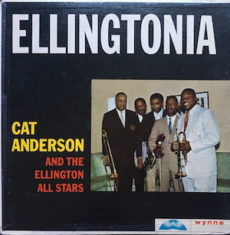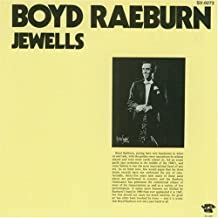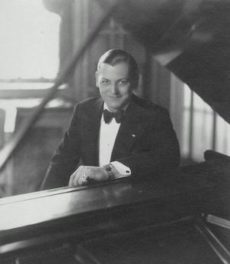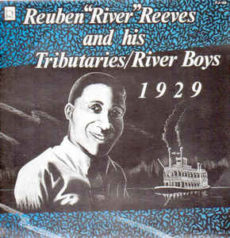
Daily Dose Of Jazz…
Rudy Powell was born in New York City on October 28, 1907 and learned piano and violin while young before taking on the clarinet and saxophone. In the late 1920s, he played with June Clark, Gene Rodgers’s Revellers, and Cliff Jackson’s Krazy Kats.
Rudy worked extensively as a sideman throughout his career. Among his credits in the 1930s are Elmer Snowden, Dave Nelson, Sam Wooding, Kaiser Marshall, Rex Stewart, Fats Waller, Edgar Hayes, and Claude Hopkins. The Forties saw him playing with Teddy Wilson, Andy Kirk, Fletcher Henderson, Eddie South, Don Redman, Chris Columbus, Cab Calloway, Lucky Millinder and Hopkins again.
By the 1950s and through the Sixties Powell was with Jimmy Rushing, Buddy Tate, Benton Heath, Ray Charles, and Buddy Johnson. Never recording as a leader, he did record with Cat Anderson, Al Casey, Duke Ellington, Cliff Jackson, Jo Jones, Lucky Millinder, Jimmy Rushing, and Saints & Sinners. He continued playing intermittently into the 1970s and was a part of the photo A Great Day In Harlem.
Clarinetist and saxophonist Rudy Powell, who later changed his name to Musheed Karweem when he joined the Ahmadiyya Muslim Community, passed away at age 69 on October 30, 1976.
More Posts: clarinet,history,instrumental,jazz,music,saxophone

Daily Dose Of Jazz…
Boyd Albert Raeburn was born in Faith, South Dakota on October 27, 1913 and attended the University of Chicago, where he led a campus band. Gaining his earliest experience as a commercial bandleader at 1933~1934 Chicago’s World Fair, for the rest of the decade, he worked in and often led dance bands.
In the Forties the group passed through swing before becoming identified with the bop school. He went on to start a big band, which was active from 1944 to 1947, performing arrangements comprable to those used by Woody Herman and the progressive jazz of Stan Kenton during the same period. The compositions arranged by George Handy were the most contemporary, and after Handy’s departure Johnny Richards joined in 1947 and for the next year he wrote 50 compositions.
He composed Rip Van Winkle for his second wife, singer Ginny Powell, who sang with her husband’s group, as well as with Harry James and Gene Krupa. Boyd left music in the mid-1950s and they moved to Nassau, Bahamas where his wife transitioned.
Settling in New Orleans, Louisiana for a time, he ran a furniture store. Bass saxophonist and bandleader Boyd Raeburn passed away of a heart attack at age 52 on August 2, 1966 in Lafayette, Indiana.
More Posts: bandleader,history,instrumental,jazz,music,saxophone

Three Wishes
Nica’s request of Julian Priester led him to answering the question of three wishes with:
-
- “The first one is a government~sponsored music program.”
- “I’d like to play with Monk.”
- “A change in this country’s economic system.”
More Posts: baroness,euphonium,history,instrumental,jazz,music,pannonica,three,trombone,wishes

Daily Dose Of Jazz…
Joseph L. Sanders was born on October 26, 1896 in Thayer, Kansas. Best known for co-leading the Coon-Sanders’ Nighthawks along with Carleton Coon, the pair formed the group in 1920 in Kansas City under the name Coon-Sanders Novelty Orchestra.
Their broadcast for the first time on radio the following year, they became simply known as the Nighthawks because of their frequent appearances on late night radio. They recorded in Chicago, Illinois in 1924 and held a residency at the Blackhawk club in that city from 1926. The ensemble toured as a Midwestern territory band, and after Coon’s death, Joe continued to lead the band under his own name.
During the 1940s Sanders worked mostly in Hollywood studios, and occasionally led performances at the Blackhawk once again. He was a vocalist for the Kansas City Opera in the 1950s.
Pianist, singer, and bandleader Joe Sanders, associated with Kansas City jazz for most of his career, passed away in Kansas City, Missouri on May 14, 1965.
More Posts: bandleader,history,instrumental,jazz,music,piano,vocal

Daily Dose Of Jazz…
Reuben “River” Reeves was born in Evansville, Indiana on October 25, 1905 and started out playing locally in the Midwest before moving to New York City in 1924. The next year he moved to Chicago, Illinois and by 1926 joined Erskine Tate’s orchestra, then played with Fess Williams and Dave Peyton by the end of the decade. While in Chicago he took lessons from a German trumpet player, Albert Cook, who played in the Chicago Symphony.
While playing at the Regal Theater in 1929, Peyton featured Reuben, his hot trumpet player, on a night where Louis Armstrong had a gig across the street at the Savoy, to outdo the latter which didn’t work. Signed to Vocalion he recorded as a bandleader with his groups the Tributaries and the River Boys. His sidemen were his brother, trombonist Gerald Reeves, and clarinetist Omer Simeon and in 1929, twenty sides were recorded in 1929.
He played under Cab Calloway in the early Thirties, and recorded again with the River Boys in 1933. He toured as a leader for two years from 1933 to 1935, then played freelance through the late 1930s. During World War II, he led an Army band called the Jungleers. Stationed at the Army Jungle Training Center on the northeast coast of Oahu, Hawaii. There they were popular participants in Battle of the Band competitions that were an integral part of the extraordinary music scene in Hawaii during the war.
After the war, he played in Harry Dial’s Blusicians in 1946. Trumpeter and bandleader Reuben Reeves, whose entire output as a bandleader has been released to a single compact disc by RST Records, passed away in September 1975 in New York City.
More Posts: bandleader,history,instrumental,jazz,music,trumpet



